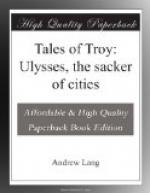Then the Trojans trembled, for they knew the shields of Diomede and Ulysses, and they thought that the tall chief in the armour of Achilles was Achilles himself, come back from the land of the dead to take vengeance for Antilochus. The Trojans fled, and gathered round Eurypylus, as in a thunderstorm little children, afraid of the lightning and the noise, run and cluster round their father, and hide their faces on his knees.
But Neoptolemus was spearing the Trojans, as a man who carries at night a beacon of fire in his boat on the sea spears the fishes that flock around, drawn by the blaze of the flame. Cruelly he avenged his father’s death on many a Trojan, and the men whom Achilles had led followed Achilles’ son, slaying to right and left, and smiting the Trojans, as they ran, between the shoulders with the spear. Thus they fought and followed while daylight lasted, but when night fell, they led Neoptolemus to his father’s hut, where the women washed him in the bath, and then he was taken to feast with Agamemnon and Menelaus and the princes. They all welcomed him, and gave him glorious gifts, swords with silver hilts, and cups of gold and silver, and they were glad, for they had driven the Trojans from their wall, and hoped that to-morrow they would slay Eurypylus, and take Troy town.
But their hope was not to be fulfilled, for though next day Eurypylus met Neoptolemus in the battle, and was slain by him, when the Greeks chased the Trojans into their city so great a storm of lightning and thunder and rain fell upon them that they retreated again to their camp. They believed that Zeus, the chief of the Gods, was angry with them, and the days went by, and Troy still stood unconquered.
THE SLAYING OF PARIS
When the Greeks were disheartened, as they often were, they consulted Calchas the prophet. He usually found that they must do something, or send for somebody, and in doing so they diverted their minds from their many misfortunes. Now, as the Trojans were fighting more bravely than before, under Deiphobus, a brother of Hector, the Greeks went to Calchas for advice, and he told them that they must send Ulysses and Diomede to bring Philoctetes the bowman from the isle of Lemnos. This was an unhappy deserted island, in which the married women, some years before, had murdered all their husbands, out of jealousy, in a single night. The Greeks had landed in Lemnos, on their way to Troy, and there Philoctetes had shot an arrow at a great water dragon which lived in a well within a cave in the lonely hills. But when he entered the cave the dragon bit him, and, though he killed it at last, its poisonous teeth wounded his foot. The wound never healed, but dripped with venom, and Philoctetes, in terrible pain, kept all the camp awake at night by his cries.




